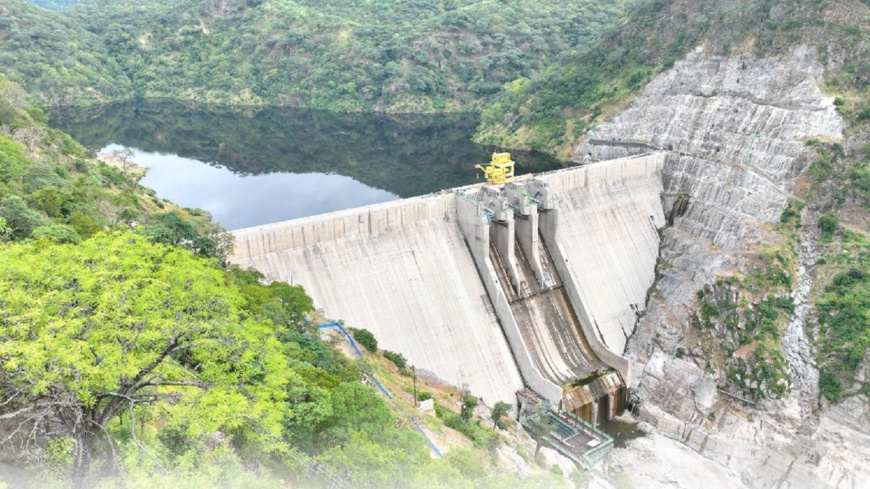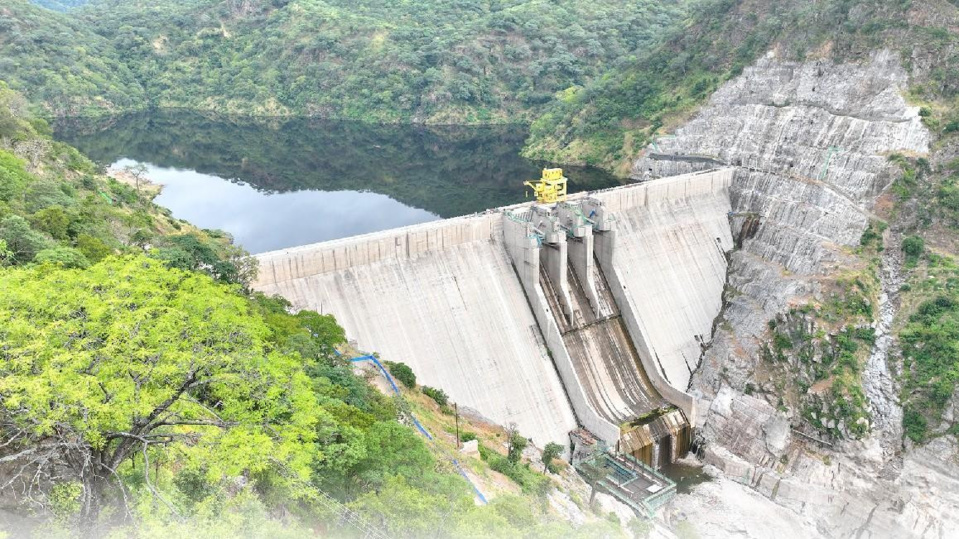By Yan Yu, People's Daily

Photo shows the Kafue Gorge Lower Power Station built by China Energy Engineering Corporation in Zambia. (Photo provided by China Energy Engineering Corporation)
A rehabilitation and modernization project of the Mbuji Mayi-Nguba section of the N1 National Road in the Democratic Republic of the Congo (DRC) recently broke ground.
Alexis Gisaro Muvuni, minister of State for Infrastructure and Public Works, driving a wheel loader, personally launched the Chinese-built project.
Muvuni said the N1 National Road is an artery linking Kinshasa, the capital of the DRC, and Lubumbashi, the country's economic hub.
DRC-China cooperation in infrastructure has yielded fruitful results, and China is working to enhance road connectivity in the DRC, bringing benefits to the Congolese people, the minister added.
Across the vast African continent, such vibrant scenes of construction are unfolding almost daily. Building roads, erecting bridges, constructing buildings, establishing factories.
For many years, numerous Chinese engineers have ventured into Africa, bringing advanced technology and rich experience to help improve local infrastructure, connectivity and integration processes.
Improving infrastructure conditions is a common expectation and urgent desire of African countries. As Moussa Faki Mahamat, chairperson of the African Union (AU) Commission, stated, infrastructure development is the cornerstone of Africa's development.
For a long time, weak infrastructure has been a major bottleneck constraining Africa's economic and social development. A study by the Infrastructure Consortium for Africa showed that poor infrastructure such as roads, railways, and harbors has added 30 percent to 40 percent to the costs of goods trade among African countries.
At the opening ceremony of the Beijing Summit of the Forum on China-Africa Cooperation (FOCAC) held in 2018, Chinese President Xi Jinping said China will implement eight major initiatives with African countries in the next three years and beyond. Infrastructure connectivity is a key focus of the initiatives.
Under the framework of FOCAC, China has been working with African countries within its capacity to help them improve infrastructure, enhance their capacity for self-growth, and achieve sustainable development.
For instance, the Addis Ababa-Djibouti railway built by Chinese companies stands as Africa's first electrified transboundary railway, symbolizing a new era of regional connectivity and progress.
The New Wami Bridge in Tanzania opened to traffic in October 2022, helping boost local agriculture, mining, transportation and other sectors with great economic and social significance.
The Chinese-built Kafue Lower Gorge Power Station in Zambia was put into operation in March 2023, generating stable electricity that powers the lives of local residents.
Statistics showed that since the founding of FOCAC, Chinese companies have built and upgraded more than 10,000 kilometers of railways, nearly 100,000 kilometers of roads, roughly 1,000 bridges, nearly 100 ports, and a large number of hospitals and schools in Africa.
Today, the practical cooperation between China and Africa in infrastructure connectivity has achieved fruitful results.
Infrastructure plays a vital role in the growth of industries.
The Foundiougne Bridge in Senegal, constructed by China Railway Seventh Group, was officially opened in 2022. It has not only become one of the main arteries connecting the north and south of the country but has also reduced the time and cost of travel from Senegal to neighboring countries.
The 46MW Biovéa biomass power plant currently under construction by China Energy Engineering Corporation in Côte d'Ivoire is expected to be completed and generate electricity by 2025. This project will provide power supply for 1.7 million local people and benefit 12,000 palm growers, increasing their income by about 20 percent.
Besides, China General Technology (Group) Holding Co., Ltd (Genertec) has participated in the design, procurement, construction, and operation of more than 2,000 communication towers in Ghana, which serve over 3 million people in the country's rural areas.
All of these vividly illustrate the cooperation between China and Africa to advance infrastructure connectivity and promote economic and social development of African countries.
Well-built infrastructure brings closer people-to-people exchanges.
Since its completion, the Addis Ababa-Djibouti Railway, linking Ethiopia and Djibouti, has provided job opportunities for over 55,000 people in local areas.
In Bissau, capital of Guinea-Bissau, local fishermen say that with the Bandim Fishing Port, constructed with Chinese assistance, it is more convenient to go fishing on the sea, and their income has improved significantly.
In the Kenyan coastal city of Mombasa, the Liwatoni Floating Bridge, the first floating bridge in East Africa built by a Chinese company, has greatly facilitated local residents crossing the sea.
The accelerated advancement of China-Africa infrastructure connectivity is bringing tangible benefits to African people.
It is thrilling to see the continuous development of infrastructure connectivity cooperation between China and Africa, which has been expanded from transportation facilities to production-oriented and life-service-oriented infrastructure connectivity, including logistics centers and industrial parks. Besides, such cooperation has extended into new infrastructure areas such as finance, internet, and digital information.
In recent years, China and Africa have been deepening digital cooperation. Chinese companies are actively participating in the construction of digital infrastructure in Africa, including submarine and land cables, 5G networks, and data centers, bringing more convenience to African users.
Moving forward, by working together to deepen friendly cooperation and advance connectivity, China and Africa will open up more avenues of development and foster stronger people-to-people connections throughout the vast African continent.
Alexis Gisaro Muvuni, minister of State for Infrastructure and Public Works, driving a wheel loader, personally launched the Chinese-built project.
Muvuni said the N1 National Road is an artery linking Kinshasa, the capital of the DRC, and Lubumbashi, the country's economic hub.
DRC-China cooperation in infrastructure has yielded fruitful results, and China is working to enhance road connectivity in the DRC, bringing benefits to the Congolese people, the minister added.
Across the vast African continent, such vibrant scenes of construction are unfolding almost daily. Building roads, erecting bridges, constructing buildings, establishing factories.
For many years, numerous Chinese engineers have ventured into Africa, bringing advanced technology and rich experience to help improve local infrastructure, connectivity and integration processes.
Improving infrastructure conditions is a common expectation and urgent desire of African countries. As Moussa Faki Mahamat, chairperson of the African Union (AU) Commission, stated, infrastructure development is the cornerstone of Africa's development.
For a long time, weak infrastructure has been a major bottleneck constraining Africa's economic and social development. A study by the Infrastructure Consortium for Africa showed that poor infrastructure such as roads, railways, and harbors has added 30 percent to 40 percent to the costs of goods trade among African countries.
At the opening ceremony of the Beijing Summit of the Forum on China-Africa Cooperation (FOCAC) held in 2018, Chinese President Xi Jinping said China will implement eight major initiatives with African countries in the next three years and beyond. Infrastructure connectivity is a key focus of the initiatives.
Under the framework of FOCAC, China has been working with African countries within its capacity to help them improve infrastructure, enhance their capacity for self-growth, and achieve sustainable development.
For instance, the Addis Ababa-Djibouti railway built by Chinese companies stands as Africa's first electrified transboundary railway, symbolizing a new era of regional connectivity and progress.
The New Wami Bridge in Tanzania opened to traffic in October 2022, helping boost local agriculture, mining, transportation and other sectors with great economic and social significance.
The Chinese-built Kafue Lower Gorge Power Station in Zambia was put into operation in March 2023, generating stable electricity that powers the lives of local residents.
Statistics showed that since the founding of FOCAC, Chinese companies have built and upgraded more than 10,000 kilometers of railways, nearly 100,000 kilometers of roads, roughly 1,000 bridges, nearly 100 ports, and a large number of hospitals and schools in Africa.
Today, the practical cooperation between China and Africa in infrastructure connectivity has achieved fruitful results.
Infrastructure plays a vital role in the growth of industries.
The Foundiougne Bridge in Senegal, constructed by China Railway Seventh Group, was officially opened in 2022. It has not only become one of the main arteries connecting the north and south of the country but has also reduced the time and cost of travel from Senegal to neighboring countries.
The 46MW Biovéa biomass power plant currently under construction by China Energy Engineering Corporation in Côte d'Ivoire is expected to be completed and generate electricity by 2025. This project will provide power supply for 1.7 million local people and benefit 12,000 palm growers, increasing their income by about 20 percent.
Besides, China General Technology (Group) Holding Co., Ltd (Genertec) has participated in the design, procurement, construction, and operation of more than 2,000 communication towers in Ghana, which serve over 3 million people in the country's rural areas.
All of these vividly illustrate the cooperation between China and Africa to advance infrastructure connectivity and promote economic and social development of African countries.
Well-built infrastructure brings closer people-to-people exchanges.
Since its completion, the Addis Ababa-Djibouti Railway, linking Ethiopia and Djibouti, has provided job opportunities for over 55,000 people in local areas.
In Bissau, capital of Guinea-Bissau, local fishermen say that with the Bandim Fishing Port, constructed with Chinese assistance, it is more convenient to go fishing on the sea, and their income has improved significantly.
In the Kenyan coastal city of Mombasa, the Liwatoni Floating Bridge, the first floating bridge in East Africa built by a Chinese company, has greatly facilitated local residents crossing the sea.
The accelerated advancement of China-Africa infrastructure connectivity is bringing tangible benefits to African people.
It is thrilling to see the continuous development of infrastructure connectivity cooperation between China and Africa, which has been expanded from transportation facilities to production-oriented and life-service-oriented infrastructure connectivity, including logistics centers and industrial parks. Besides, such cooperation has extended into new infrastructure areas such as finance, internet, and digital information.
In recent years, China and Africa have been deepening digital cooperation. Chinese companies are actively participating in the construction of digital infrastructure in Africa, including submarine and land cables, 5G networks, and data centers, bringing more convenience to African users.
Moving forward, by working together to deepen friendly cooperation and advance connectivity, China and Africa will open up more avenues of development and foster stronger people-to-people connections throughout the vast African continent.
 Menu
Menu
 China-Africa infrastructure cooperation fosters closer people-to-people connections
China-Africa infrastructure cooperation fosters closer people-to-people connections
















